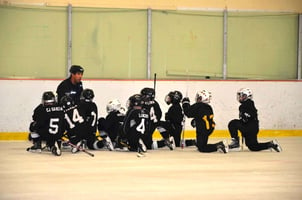As a coach, your job isn’t just to win games, it’s to build a team. That means developing every...
Are Private Lessons Worth The Money?
The ol’ question in youth sports: “What’s the Return on Investment (ROI)?”
Before we tackle this subject, understand ROI here is a reference—not a promise that you’ll “get paid back.” Your true ROI should be positive hockey experiences, life lessons, friendships, and memories. If you think youth sports will pay for college, put your money in an interest-bearing account, you’ll cover Little Johnny’s scholarship multiple times before he turns 18.
The Reality of Youth Hockey Costs
Youth hockey is one of the most rewarding, and expensive, sports for families. Between team fees, equipment, and travel, adding private lessons can feel like a big decision. So, are they worth it?
The honest answer: it depends on your child’s goals, age, and motivation. Let’s break it down before you spend your hard-earned money.
The Benefits of Private Lessons
Private lessons offer something team practices rarely provide: personalized attention. Here’s why that matters:
Individualized Attention
In a team setting, coaches divide time among 15–20 players. Private lessons allow laser-focused instruction on your child’s unique needs, whether it’s skating stride, stickhandling, or shooting mechanics.
Skill Development Beyond Team Practice
Team practices often prioritize systems and game play. Private sessions emphasize fundamentals like edge work, puck control, and body positioning, skills that separate good players from great ones.
Confidence Boost
Kids often feel more comfortable asking questions and trying new techniques in a one-on-one setting. This confidence can translate into better game performance.
Competitive Edge
If your child is aiming to accelerate development or prepare for higher-level hockey, private lessons can help them stand out.
Things to Consider Before Spending
Before you commit, weigh these factors:
-
Cost vs. Frequency
Private lessons typically range from $50–$150 per hour. Occasional sessions for targeted skills may be more cost-effective than weekly lessons. Overdoing it can drain your budget without proportional improvement. -
Age & Commitment
For younger players (under 10), group clinics or small-area games often provide similar benefits at a lower cost. Private lessons work best when the player is motivated, not when parents are pushing. -
Coach Quality (This is Huge!)
A great player doesn’t always make a great coach. Look for instructors with proven teaching ability and a track record of developing youth players. -
Balance
Overloading on private lessons can lead to burnout. Kids need fun, creativity, and unstructured ice time to stay passionate about the game.
Private Lessons vs. Team Clinics: ROI Breakdown
| Factor | Private Lessons | Team Clinics |
|---|---|---|
| Cost | $50–$150/hr | $20–$50/session |
| Skill Impact | High for targeted skills | Moderate; good for game situations |
| Long-Term Benefit | Strong if player is motivated | Builds hockey IQ and teamwork |
| Risk | Expensive; diminishing returns | Less individualized attention |
Bottom Line:
- Private lessons = best for specific skill gaps and motivated players
- Clinics = best for overall development and cost efficiency
When Private Lessons Make Sense
- Your child is committed and wants to improve specific skills
- Team practices aren’t enough for fundamentals
- You have a qualified coach with proven teaching ability
- Your child is preparing for tryouts or higher-level hockey
When Private Lessons Don’t Make Sense
- Player is young (<10) and needs fun, game-based learning
- Budget is tight and clinics offer similar benefits
- Player lacks motivation, private lessons won’t fix that
- You’re doing it because “everyone else is” development should be player-driven
Alternatives to Private Lessons
- Small Group Sessions
Cheaper than private lessons but still offer personalized attention. - Off-Ice Training
Strength, agility, and conditioning can dramatically improve on-ice performance. - Unstructured Ice Time (My Favorite!)
Let kids play on their own without scrutiny. Creativity thrives without pressure. If extra ice isn’t available, knee hockey, ball hockey, or roller hockey are incredible teachers.
Final Thoughts
Private lessons can be a great investment, but only when used strategically. Focus on targeted skills, ensure your child is motivated, and balance lessons with team play and fun. For many families, occasional private sessions combined with clinics and off-ice work offer the best return on investment.
In the end, listen to your child. If they don’t want to do it, don’t like the coach, or don’t practice the skills on their own, step in and make a change. Don’t force it, development should be enjoyable.




